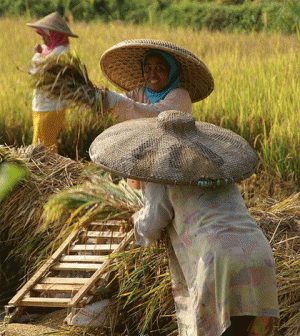- Finding Unshakable Power in a World That Wants to Pull Us ApartPosted 6 months ago
- What could a Donald Trump presidency mean for abortion rights?Posted 6 months ago
- Financial Empowerment: The Game-Changer for Women in Relationships and BeyondPosted 7 months ago
- Mental Health and Wellbeing Tips During and After PregnancyPosted 7 months ago
- Fall Renewal: Step outside your Comfort Zone & Experience Vibrant ChangePosted 7 months ago
- Women Entrepreneurs Need Support SystemsPosted 7 months ago
First woman to lead Indonesia's indigenous peoples alliance

By Rina Chandran | Thomson Reuters Foundation
“Indigenous women face discrimination on several fronts… this has strengthened our resolve to assert our rights, because when women have equal rights, our communities benefit”
MUMBAI, May 29 – Indigenous women in Indonesia are taking the lead in the fight to protect their land and communities as a rise in conflicts threatens tribes living on lands coveted by extractive and logging companies, a prominent activist said.
Rukka Sombolinggi, 44, of the Torajan tribe from the highlands of Sulawesi island, this week becomes the first woman at the helm of the Indigenous Peoples Alliance of the Archipelago (AMAN).
“This is the first time we had not one, but two female candidates for the post. This is progress,” Sombolinggi, secretary general for AMAN, told the Thomson Reuters Foundation.
“Indigenous women face discrimination on several fronts: We are poor, we are indigenous, and we are women. But this has strengthened our resolve to assert our rights, because when women have equal rights, our communities benefit.”
A sprawling archipelago of more than 17,000 islands, Indonesia is home to an estimated 50 to 70 million indigenous people. Many do not have formal titles to the land their families have lived on for generations.
For decades, they have been locked in fierce battles with logging, palm oil and mining companies that have been expanding into their homelands in the resource-rich nation.
In 2013, Indonesia’s Constitutional Court ruled indigenous people have the right to manage forests where they live, in a verdict hailed as a victory for indigenous land rights.
Last December, President Joko Widodo announced Indonesia would return 13,000 hectares of customary lands to nine indigenous groups – and committed to giving back a total of 12.7 million hectares to local and indigenous groups, in a decision hailed as a breakthrough for indigenous rights.
But while Widodo has pledged to improve their lives, activists including Sombolinggi say his plans to boost infrastructure and energy production mean more tribes are at risk of being displaced, and even becoming extinct.
“There are some good policies. But many of them are not implemented at the provincial and local level, where they are most needed,” Sombolinggi said.
Women leaders are essential to ensuring the protection of indigenous rights, she said, noting that Indonesia’s 30 percent gender quota to increase women’s representation in parliament is usually filled by the wives of wealthy men.
“Poor indigenous women cannot compete with these women,” Sombolinggi said by Skype from Jakarta.
“In the 80s and 90s, indigenous women stood at the frontline against oppression and land grabbing, but it has become harder over the past years for women to engage.”
AMAN, which represents about 17 million indigenous people from more than 2,300 indigenous communities in Indonesia, is empowering women to play a more active role, she said.
A draft law to recognise and protect indigenous peoples’ rights – the result of years of lobbying by AMAN and other organisations – was listed last year by the House of Representatives as a priority for 2017.
The law is at the top of Sombolinggi’s to-do list.
“Our most critical task is to ensure this law is passed and that the rights of our people are protected,” she said.
(Reporting by Rina Chandran @rinachandran, Editing by Alisa Tang. Please credit the Thomson Reuters Foundation, the charitable arm of Thomson Reuters, that covers humanitarian news, women’s rights, trafficking, property rights, climate change and resilience. Visit news.trust.org to see more stories.)






